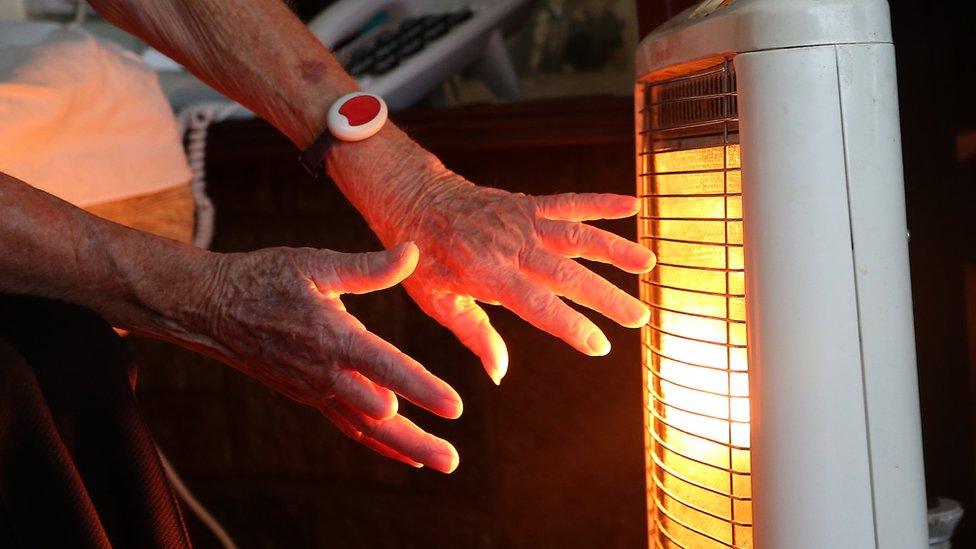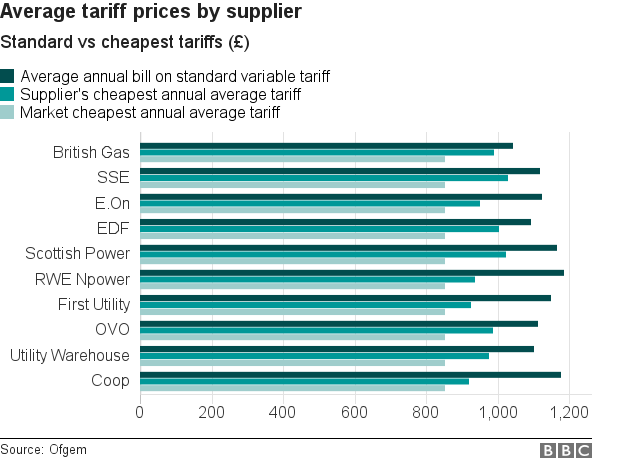Energy watchdog 'should use its powers' on price cap
- Published
- comments

Ofgem should use its powers to impose a wider cap on energy bills more quickly, Business Secretary Greg Clark has said.
The watchdog has warned it could be sued by gas and electricity firms if it capped standard variable tariffs without the backing of new legislation.
Ministers published a draft law last month which would put further limits on this type of household energy bill.
But Mr Clark said he would prefer the energy regulator to act now "so we could get on with it immediately".
The business secretary could not guarantee that a new cap would be in place by winter 2018 if it required parliamentary approval.
About 12 million households are on some form of default tariff, which can cost hundreds of pounds a year more than the cheapest deals.
There is already a cap in place for customers on pre-payment meters, which is being extended to include another one million low income households from February.
Under the government's draft bill, Ofgem would set the terms of a new broader cap on standard variable tariffs, which would initially last until 2020.

But Mr Clark would like Ofgem to act before legislation is passed.
"I've been very clear that I would much prefer them to make use of the powers they have," Mr Clark told MPs on the business select committee.
He said policy changes were often at risk from potential legal challenges, but added that public bodies can also defend themselves against such action.
"I would be very disappointed if there were a legal challenge by some of the energy companies," he added.
Legal challenge
Rachel Reeves, the chair of the business select committee, noted that Ofgem had said it would not set its own price cap for default tariffs "because energy companies would not rule out a legal challenge".
As a result the government has said it will go ahead with the Draft Domestic Gas and Electricity (Tariffs Cap) Bill, external.
However, it is unlikely such a cap would come into effect in time for this winter.
Asked if it would be in place by Winter 2018, Mr Clark said he could not give any guarantees until the draft legislation was given a slot in parliament.
But he hoped that with cross-party support for a cap, the bill would be passed "as soon as possible".


Who benefits this winter?
One million households who get the Warm Home Discount will see an energy price cap from February - an extension of the cap already in place for prepayment meter customers. This will also apply to another two million vulnerable households the following winter.
What is a standard variable tariff?
When customers' fixed-term deals end they usually automatically move to this tariff, which applies to 12 million households. Ofgem says the price difference between the average standard variable tariff default deal and the cheapest rate in the market recently hit more than £300.
What does the government want to do?
It has revived a plan to cap these variable tariffs, overseen by Ofgem, but the regulator says this will not happen until new legislation has been passed by Parliament. It is unclear just how long this will take.
What happens in the meantime?
Some suppliers are moving towards abandoning variable tariffs. Ofgem has also changed the rules to allow suppliers to automatically switch customers onto another fixed deal. Customers are still likely to be better off by searching and switching themselves.

- Published12 October 2017

- Published12 October 2017
